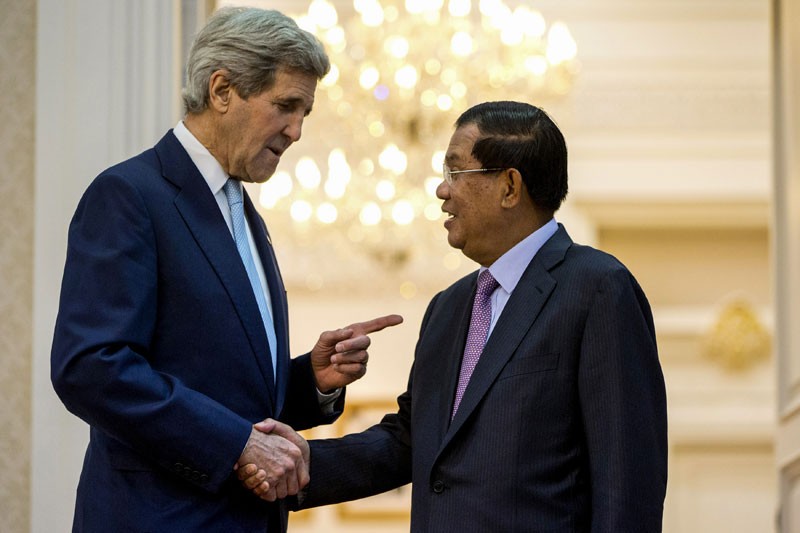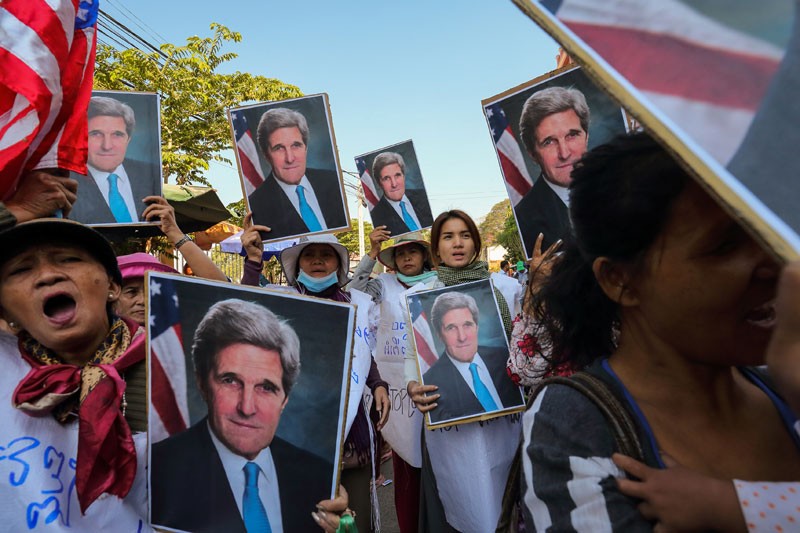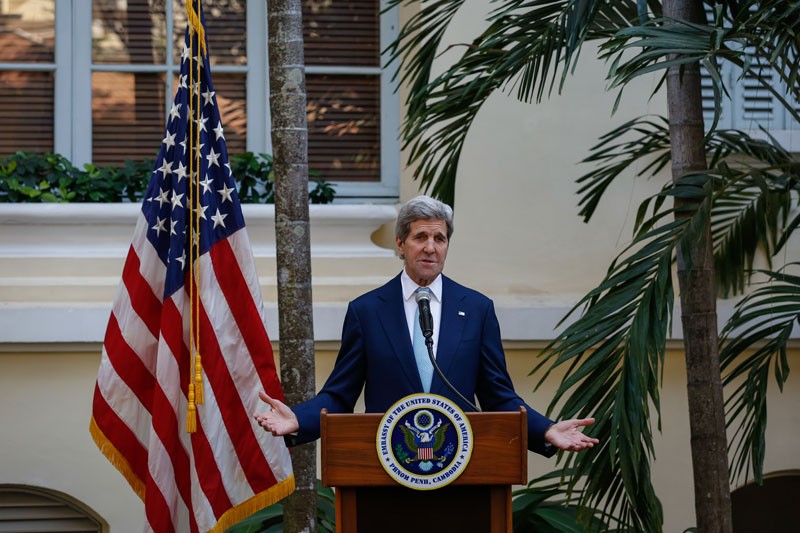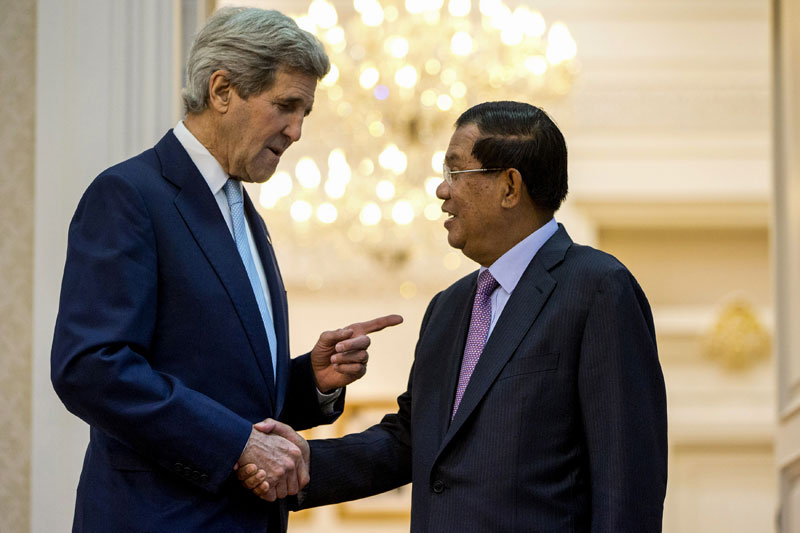Speaking in the garden of the Raffles Hotel on Tuesday afternoon, U.S. Secretary of State John Kerry said the “urgent challenge” of countering extremism, building business ties and seeing Cambodia become a thriving democracy were at the top of his agenda during his daylong visit to Phnom Penh.
Mr. Kerry, whose trip to Cambodia comes ahead of the February U.S.-Asean summit in Sunnylands, California, described his morning meetings with Prime Minister Hun Sen and Foreign Minister Hor Namhong as being “candid and constructive.”

In remarks following his talks with Mr. Namhong and again in his address in the afternoon, Mr. Kerry said that bringing Cambodia into the fold in the fight against the Islamic State group was a priority for the U.S.
“Today I also discussed with the Prime Minister the urgent challenge internationally of countering violent extremism. And we agreed that this is absolutely a top priority in the relationship between any country today,” Mr. Kerry said in his afternoon address.
“The prime minister expressed a deep interest in Cambodia working with our counter-Daesh coalition,” Mr. Kerry said, using a term for I.S. derived from its Arabic spelling.
“He expressed an interest in having our teams, our experts, come in order to brief and exchange ideas, and we agreed to that,” he said, adding that the summit in Sunnylands would provide an opportunity for the assembled leaders to have an “in-depth dialogue” on the topic.
Civil society groups sent Mr. Kerry an open letter this week urging him to address a litany of human rights abuses in Cambodia and a recent offensive against the political opposition during his meeting with Mr. Hun Sen.
Mr. Kerry said he had stated his desire to see the Cambodian people benefit from having their country become a “thriving, multiparty democracy.”
“I made it clear also in my meetings today that it is our hope—I think it’s a global hope—that Cambodia will realize the full benefits of a thriving, multiparty democracy,” he said.
“We care deeply about respect for human rights, universal freedoms, and good governance,” he added. “And progress in each of these areas is really critical to being able to fulfill the potential of our bilateral relations but also, importantly, the full potential of the hopes and aspirations of the Cambodian people.”
Cambodian state news agency AKP took a different angle to Mr. Kerry’s talks with the prime minister, heralding the fact that human rights had not been raised, in an article on its website headlined “No Human Rights Issue Mentioned During Talks between Cambodian PM and U.S. Secretary of State.”

In an apparent reference to the October beatings of opposition lawmakers Nhay Chamroeun and Kong Saphea, Mr. Kerry said ensuring the safety of lawmakers was “a fundamental responsibility” of the government.
“Democratic governments have a responsibility to ensure that all elected representatives are free to perform their responsibilities without fear of attack or arrest,” he said.
Earlier in the afternoon, Mr. Kerry met with a delegation of senior opposition officials, including deputy opposition leader Kem Soha, and held a separate meeting with local civil society leaders.
“In every meeting, I made clear that we are committed—we the United States of America are committed—to the relationship between our country and Cambodia,” he said.
In a message posted to Facebook, Ou Virak, founder of the Future Forum think tank, who at- tended the meeting with Mr. Kerry, said the discussion was longer than he expected, “but still very short and also short on substance.”
Mr. Kerry’s Twitter account kept a running diary of his events during the day, including a morning visit to the National Museum, but notably omitted his meeting with opposition officials. In his meeting with government leaders, he wrote that he “Discussed economic & ASEAN issues, strengthening democracy & bilateral relationship.”

The secretary of state, who visited Cambodia numerous times as a U.S. senator in the 1990s, noted during his afternoon address the country’s rapid development since he was last here and the desire of the U.S. to strengthen economic relations.
“The progress you have made in Cambodia is quite remarkable,” he said. “When I first came here, this was a city of 350,000 people and a very war-torn economy, [and it] is now a city of 2.2 million people with a very modern hospital, skyscrapers, enormous energy and many, many tourists.”
Mr. Kerry said it was “actually quite remarkable” that the U.S. remained Cambodia’s top export market.
“And we will continue to explore ways to deepen our trade and investment relationship including by helping to tackle corruption and exploring ways to strengthen Cambodia’s legal institutions,” he said.
Unlike former U.S. Secretary of State Hillary Clinton, who hosted a public discussion with hundreds of students during her visit to Cambodia in 2010, Mr. Kerry did not avail himself to any public questions, and his meetings were closed to the press.
Mr. Namhong, the foreign minister, also highlighted the importance of cooperation in the fight against I.S. in remarks following his meeting with Mr. Kerry.
“I do not believe that clearing I.S. can be done by one country or one country’s military,” he said. “Because of the cruel action of the [I.S.], it is not a threat for only Iraq and Syria, but it is in Africa and Asia, too.”
And despite the tension between the U.S. and China over claims in the South China Sea, and wider competition between the superpowers for influence in the region, Mr. Namhong said Mr. Kerry did not push Cambodia on issues related to China.
“His Excellency John Kerry also said that he did not ask Cambodia to support America or support China,” he said. “I explained to him that in fact, Cambodia is a small country and it is [a] poor country, but we are independent.”
Cambodia has come under heavy criticism for being perceived as siding with China in its territorial disputes with a number of Asean countries in the South China Sea.
During Mr. Kerry’s discussion with Mr. Hun Sen, the prime minister requested continued U.S. support in the “health sector, education section, mine clearing,” according to his personal assistant, Eang Sophalleth, who briefed reporters after the meeting.
Mr. Hun Sen also expressed his desire for the U.S. to consider “letting Cambodia export goods to the U.S. without quotas or tax, factors that will help to push Cambodia’s development,” Mr. Sophalleth said.




